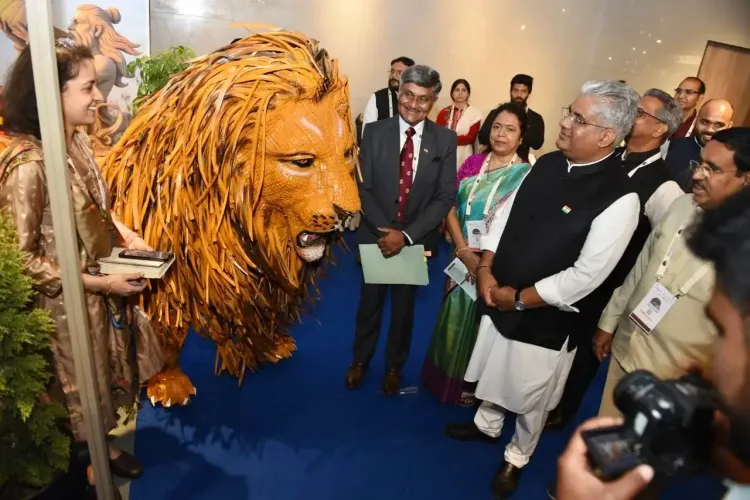Potential of India’s Circular Economy Reaches $2 Trillion, Asserts Bhupender Yadav

Synopsis
Key Takeaways
- India's circular economy could reach $2 trillion in value by 2050.
- Close to 10 million jobs may be created through this economic model.
- Initiatives like Eco-Mark Rules emphasize sustainable products.
- Memorandum of Understanding signed for enhanced research in waste management.
- SBM Waste to Wealth PMS Portal launched to improve resource management.
Jaipur, March 4 (NationPress) The circular economy in India holds the potential to create a market worth over $2 trillion and generate nearly 10 million jobs by 2050, stated Minister for Environment, Forest & Climate Change Bhupender Yadav on Tuesday.
During his address at the 12th Regional 3R and Circular Economy Forum in Asia and the Pacific, Yadav highlighted that the circular economy might lead to one of the most significant shifts in business practices since the Industrial Revolution 250 years ago.
By shifting away from the conventional 'take, make, waste' production and consumption patterns, the circular economy is projected to yield an additional $4.5 trillion in global economic output by 2030, he mentioned.
Yadav also shared news about India's bid to host the World Circular Economy Forum in 2026. Currently, the forum is being held in Sao Paulo, Brazil, and India is eager to take the lead in 2026.
Reiterating the government’s commitment to environmentally sustainable actions, the Minister emphasized India's dedication to tackling the challenges posed by plastic waste and its ecological repercussions. The Plastic Waste Management Rules (2016) have initiated significant actions targeting various sectors, including municipal, industrial, residential, and commercial. India implemented a ban on specific types of single-use plastics through a notification in 2022.
Aligned with the 'LiFE' initiative, the government has introduced the Eco-Mark Rules to stimulate demand for eco-friendly products while endorsing energy efficiency and circular economy principles.
The Minister further stated that Circular Economy Action Plans for 10 categories of waste have been finalized, with a regulatory and implementation framework currently in progress. India has already established various waste management and extended producer responsibility regulations, including the Plastic Waste Management Rules, e-Waste Management Rules, Construction and Demolition Waste Management Rules, and Metals Recycling Policy, among others.
In a crucial session, chaired by Srinivas Kathikala, Secretary of Housing and Urban Affairs, and Sudhansh Pant, Chief Secretary of Rajasthan, discussions centered on advancing waste management and circular economy initiatives. The session included the launch of several important reports, best practices, and the signing of key agreements intended to enhance India's waste management ecosystem.
A standout moment was the introduction of the SBM Waste to Wealth PMS Portal, an innovative platform created under the Swachh Bharat Mission (SBM). This portal aims to improve project monitoring, streamline data management, and facilitate resource sharing, thereby supporting the mission's broader goal of converting waste into valuable resources. This initiative aligns with the government’s commitment to sustainable urban development and effective solid waste management.
The session also featured the launch of the IFC Document Reference Guide: Business Models and Economic Assistance for Municipal Solid Waste (MSW) Projects. This guide provides in-depth insights into various business models for MSW processing, including waste-to-electricity, biomethanation, and bioremediation. The document serves as a vital resource for municipalities and private entities seeking to implement efficient and economically sustainable waste management projects.
To promote scientific collaboration in waste management, a Memorandum of Understanding (MoU) was signed between the Council of Scientific and Industrial Research (CSIR) and the Ministry of Housing and Urban Affairs (MoHUA). This partnership aims to foster research-driven solutions and innovative technologies to improve urban waste management practices throughout India.
The event also witnessed the release of “India’s Circular Sutra: A Compendium of Best Practices in 3R & Circular Economy”. This compendium captures successful case studies and innovative strategies within the Reduce, Reuse, and Recycle (3R) framework, offering invaluable insights for urban local bodies and stakeholders looking to adopt circular economy solutions.
These initiatives represent a substantial advancement in India’s commitment to fostering sustainable waste management, sparking innovation, and propelling the transition to a circular economy.
The Council on Energy, Environment, and Water (CEEW) recently presented its latest study, detailing solid waste management (SWM) practices in cities with populations exceeding one million. The report underscores sustainable waste management strategies, circular economy principles, and decentralized solutions tailored to address the unique challenges of India’s rapidly urbanizing regions.









